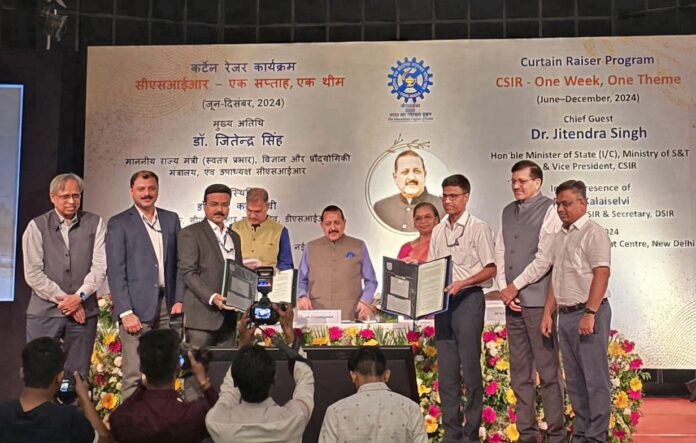CSIR-National Institute for Interdisciplinary Science and Technology (CSIR-NIIST), Thiruvananthapuram, has inked a Memorandum of Understanding (MoU) with All India Institute of Medical Sciences (AIIMS), New Delhi, for validating the technology that offers a sustainable and energy-efficient alternative to current practices in disposing pathogenic biomedical waste.
The MoU was signed on the sidelines of the curtain raiser of CSIR’s ‘One Week One Theme’ (OWOT) programme at India Habitat Centre, New Delhi yesterday.
CSIR-NIIST has developed a dual disinfection-solidification system that can spontaneously disinfect and immobilize degradable pathogenic biomedical waste such as blood, urine, saliva, sputum, and laboratory disposables, besides imparting a pleasant natural fragrance to otherwise foul-smelling biomedical waste.
CSIR-NIIST, a constituent laboratory under the Council of Scientific and Industrial Research (CSIR), Ministry of Science and Technology, Govt. of India, has developed the technology at its laboratory at Pappanamcode here.
The technology has the potential for far-reaching consequences in the global biomedical arena, as it can address the limitations of conventional technologies, including energy-intense incineration. It will be validated via a pilot-scale installation and accompanying R&D at the AIIMS. The two institutions will have a technical meeting for finalizing the specifications prior to initiation of the proposed study.
As per the press release, the developed technology has also been confirmed by expert third-parties for its antimicrobial action and non-toxic nature of the treated material. Soil studies have confirmed that the treated biomedical waste is superior to organic fertilizers like vermicompost.
CSIR-NIIST Director Dr C. Anandharamakrishnan and Director, AIIMS, New Delhi, Dr M Srinivas, exchanged the MoU in the presence of Union Minister of State for Science & Technology and Vice President, CSIR, Dr. Jitendra Singh.
Secretary, DSIR and Director General, CSIR, Dr. N Kalaiselvi; and Director, CSIR-CBRI, Prof R. Pradeep Kumar, were also present. Dr. Jitendra Singh said scientists need to look into how all those resources which have remained unexplored are going to do the value addition to carry India to the top pedestal.
“Scientific community need to explore Himalayan and marine resources and we have an opportunity to explore further the lesser explored. That is going to add value as we are already saturated,” Dr. Singh added. Dr. Kalaiselvi said OWOT is one platform wherein CSIR can showcase to the entire nation innovative ideas based on seven themes.
“These ideas will help us win the confidence of stakeholders. We’ll showcase to the entire world that CSIR will be the ultimate technology provider and help the nation stay itself as a leading capital on global arena as far as technology transfer is concerned,” Dr. Kalaiselvi added. CSIR-NIIST Director Dr C. Anandharamakrishnan said CSIR-NIIST is actively working on various waste management strategies, including biomedical waste, and environmental wellbeing.
“Global sustainability is our prime concern at CSIR-NIIST. The technology that we developed for converting pathogenic biomedical waste into value-added soil additives is a perfect example for the ‘Waste to Wealth’ concept,” he said.
Dr Anandharamakrishnan said CSIR-NIIST is committed to delivering sustainability in every technology with societal, national and global significance. It also targets an innovative solution for the safe and eco-friendly management of pathogenic biomedical waste through the present technology.
Biomedical waste, which includes potentially infectious and pathogenic materials, presents a significant challenge for proper management and disposal. As per a 2020 report by the Central Pollution Control Board (CPCB), India produces around 774 tonnes of biomedical waste daily.
CSIR-NIIST has also developed an automated and integrated equipment to ensure minimal human exposure during any stage of pathogenic biomedical waste treatment. The equipment was displayed at a previous expo organized by CSIR at Bharat Mandapam in New Delhi last year.
On the occasion, CSIR-NIIST also transferred the technology for manufacturing plant leather alternatives from agri waste (cactus) to startup Veganvista Corp Pvt Ltd., Ahmedabad. This technology assures reduction of carbon footprint and utilisation waste lands in arid and semi-arid regions for cactus cultivation and value addition to farmers in Rajasthan, Gujarat, and Maharashtra.
Besides, CSIR-NIIST’s technology for making plant oil sourced bio-resin for paper coating was also transferred to a startup owned by Sanchit Gulati and his team, Panipat, Haryana, at the event. The process knowhow developed on bio-resin coating from plant oils can replace single use plastic liner on paper and other cellulosic products to design an eco-friendly, green and sustainable packaging material with biodegradability and re-pulpability potential.
























